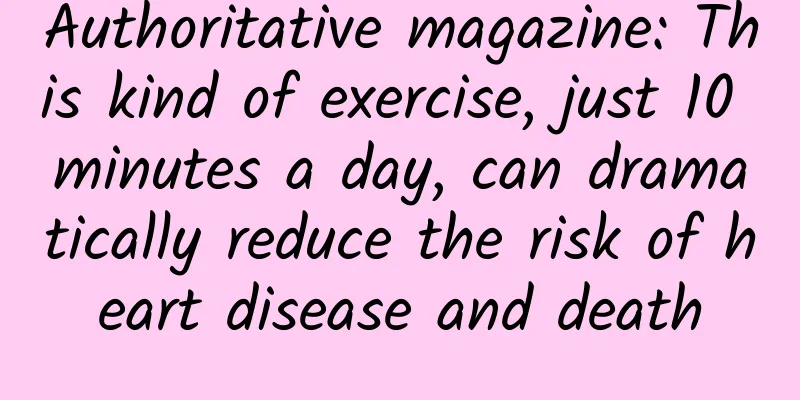Authoritative magazine: This kind of exercise, just 10 minutes a day, can dramatically reduce the risk of heart disease and death

|
Cardiovascular disease (CVD) is the leading cause of death in the world and also the leading cause of death in my country. According to statistics from the World Health Organization, nearly 18 million people die from cardiovascular disease each year, accounting for more than 30% of the total number of deaths worldwide. The high mortality and morbidity rates of cardiovascular disease are a major global public health issue that urgently needs to be addressed. Recently, researchers from the University of Sydney in Australia and the University of Oxford in the UK published a research paper titled "Brief bouts of device-measured intermittent lifestyle physical activity and its association with major adverse cardiovascular events and mortality in people who do not exercise: a prospective cohort study" in "The Lancet Public Health", a subsidiary of The Lancet. In this study, researchers analyzed 25,241 participants in the UK Biobank database, aged between 42 and 78 years old. The participants' movement parameters were recorded by wearing accelerometers. The MV-ILPA duration was divided into: less than 1 minute, 1-3 minutes, 3-5 minutes, and 5-10 minutes. The relationship between moderate to vigorous intermittent exercise and major adverse cardiovascular events (MACE) and all-cause mortality was analyzed. Overall, 824 major adverse cardiovascular events and 1111 deaths were recorded during the 8-year follow-up. Among all participants, the average duration of MV-ILPA per day was 26.8 minutes, with 59.7% having bouts of less than 1 minute, 27.5% having bouts lasting 1-3 minutes, 5.7% having bouts lasting 3-5 minutes, and 4.4% having bouts lasting 5-10 minutes. The analysis found that those with bouts of less than 1 minute had a 4.28% risk of death within 5 years, those with bouts lasting 1-3 minutes had a 2.83% risk of death within 5 years, those with bouts lasting 3-5 minutes had a 2.43% risk of death within 5 years, and those with bouts lasting 5-10 minutes had a 2.09% risk of death within 5 years. At the same time, people whose bouts lasted less than 1 minute had a 3.5% risk of major adverse cardiovascular events within 5 years, people whose bouts lasted 1-3 minutes had a 2.27% risk of major adverse cardiovascular events within 5 years, people whose bouts lasted 3-5 minutes had a 2.07% risk of major adverse cardiovascular events within 5 years, and people whose bouts lasted 5-10 minutes had a 2.06% risk of major adverse cardiovascular events within 5 years. The study found that compared with people whose bouts lasted less than 1 minute, those who had bouts lasting 1-3 minutes had a 34% lower risk of death, those who had bouts lasting 3-5 minutes had a 44% lower risk of death, and those who had bouts lasting 5-10 minutes had a 52% lower risk of death. For major adverse cardiovascular events, compared with those with bouts of less than 1 minute, those who lasted 1-3 minutes per bout had a 29% lower risk of major adverse cardiovascular events, those who lasted 3-5 minutes per bout had a 38% lower risk of major adverse cardiovascular events, and those who lasted 5-10 minutes per bout had a 41% lower risk of major adverse cardiovascular events. Association of MV-ILPA with all-cause mortality and MACE In addition, the researchers found that among people whose bouts were less than 1 minute, exercise duration of less than 1 minute also provided benefits, reducing the risk of major adverse cardiovascular events and all-cause mortality, when high-intensity exercise accounted for at least 15% of the total MV-ILPA duration. The researchers said the study showed that moderate to vigorous intermittent exercise can reduce the risk of major cardiac events. If possible, it is best to exercise for 3-5 minutes each time, which can significantly reduce the risk of major adverse cardiovascular events and all-cause mortality. Still, the researchers stress that this is an observational study and cannot establish cause and effect, and the take-home message here is that any type of exercise is good for health, but the more effort you put in and the longer you do it, the greater the benefits. In summary, the results suggest that 5 to 10 minutes of moderate to vigorous intermittent exercise per day can acutely reduce the risk of major adverse cardiovascular events and all-cause mortality. Paper link: https://doi.org/10.1016/S2468-2667 (23)00183-4 |
>>: Wearing pajamas VS sleeping naked, which is healthier? The truth is surprising
Recommend
What is the cause of lower abdominal distension in late pregnancy?
Women always experience many symptoms during preg...
Interpret the blood sugar index you care about most
Recently, there have been reports online that new...
What to check 42 days after cesarean section
Caesarean section is currently a more common meth...
Female vagina structure
The vagina is one of the body parts that every wo...
Farting in the vagina
Vaginal fart is actually the phenomenon of female...
What are the dangers of uterine dysplasia?
The uterus is where life is conceived. Only when ...
How much do you know about the precautions in the first three months of pregnancy
For women who want to get pregnant as soon as pos...
Can I eat raisins during menstruation?
Grapes are the most common fruit in our lives, an...
What to do if your menstruation is irregular at 15 years old
Nowadays, girls grow and develop relatively fast....
Standard chart of abdominal circumference and uterine height during pregnancy
Every pregnant woman has a standard fetal abdomin...
Ten things to be careful of when having a healthy uterus
The uterus is not only an organ that nurtures the...
Do you know what the “three axes” for preventing and controlling myopia in children are?
Author: Yu Gang, former chief physician of Beijin...
7 types of people, please pay attention! Check your kidney function regularly and do these 3 things!
As a silent organ, the kidney has a very powerful...
Why does menstrual blood smell rancid?
Menstruation is usually dark red and does not clo...









